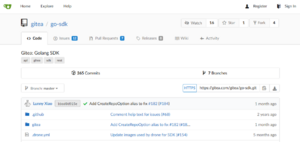Software:Gitea
 A screenshot of a Gitea repository | |
| Written in | Go, JavaScript |
|---|---|
| Operating system | Cross-platform |
| Platform | x86-64, ARM |
| Available in | Many languages |
| Type | Collaborative version control (forge) |
Gitea (/ɡɪˈtiː/[2]) is a forge software package for hosting software development version control using Git as well as other collaborative features like bug tracking, code review, continuous integration, kanban boards, tickets, and wikis. It supports self-hosting[3][4][5][6] but also provides a free public first-party instance. It is a fork of Gogs and is written in Go.[3][4][5][6] Gitea can be hosted on all platforms supported by Go[7] including Linux, macOS, and Windows.[4] The project is funded on Open Collective.[8]
History
Gitea was created by Lunny Xiao, who was also a contributor of its predecessor, the self-hosted Git service Gogs. He invited a group of users and contributors of Gogs. Though Gogs was an open-source project, its repository was under the control of a single maintainer, limiting the amount of input and speed with which the community could influence the development. Frustrated by this, the Gitea developers began Gitea as a fork of Gogs in November 2016 and established a community-driven model for its development.[5] It had its official 1.0 release the following month, December 2016.[9]
Forgejo fork
In October 2022, the company Gitea Limited was formed by Lunny Xiao to offer paid services.[10][11] The shift away from a community/non-profit ownership model received some resistance which led to the Forgejo[12] software fork of Gitea.[13] The major software forge Codeberg then switched their software from Gitea to Forgejo.[14]
See also
- Source control
- Distributed version control
- Self hosting
- Comparison of source code hosting facilities
- Open-source software
- GitHub
- GitLab
- Bitbucket
References
- ↑ "Voting for new logo #1516". https://github.com/go-gitea/gitea/issues/1516.
- ↑ "Gitea - Git with a cup of tea". https://github.com/go-gitea/gitea/tree/main#faq. "Gitea is pronounced /ɡɪˈtiː/ as in gi-tea with a hard g."
- ↑ 3.0 3.1 Rutland, David (December 9, 2022). "Install Gitea on a Raspberry Pi to Create Your Own Code Repository" (in en). https://www.makeuseof.com/install-gitea-raspberry-pi-create-your-own-code-repository/.
- ↑ 4.0 4.1 4.2 Papadopoulou, Eirini-Eleni (January 28, 2019). "Gitea is all grown up: What's new in version 1.7.0". https://jaxenter.com/gitea-self-hosted-git-service-1-7-0-154909.html.
- ↑ 5.0 5.1 5.2 Santilli, Sandro (December 8, 2016). "Welcome to Gitea". https://blog.gitea.io/2016/12/welcome-to-gitea/.
- ↑ 6.0 6.1 Krill, Paul (January 4, 2017). "Developers pick up new Git code-hosting option". https://www.infoworld.com/article/3154349/developers-pick-up-new-git-code-hosting-option.html.
- ↑ "Install gitea on openSUSE using the Snap Store". https://snapcraft.io/install/gitea/opensuse.
- ↑ "Gitea". 25 January 2024. https://opencollective.com/gitea.
- ↑ Boerger, Thomas (December 23, 2016). "Release of 1.0.0". https://blog.gitea.io/2016/12/release-of-1.0.0/.
- ↑ "Open source sustainment and the future of Gitea". October 25, 2022. https://blog.gitea.io/2022/10/open-source-sustainment-and-the-future-of-gitea/.
- ↑ Xiao, Lunny (October 30, 2022). "A message from Lunny on Gitea Ltd. and the Gitea project". https://blog.gitea.io/2022/10/a-message-from-lunny-on-gitea-ltd.-and-the-gitea-project/.
- ↑ "Forgejo FAQ | Forgejo – Beyond coding. We forge." (in en). https://forgejo.org/faq/#why-was-forgejo-created.
- ↑ Tietze, Christian (November 25, 2022). "Gitea Ltd. Takes Over Gitea Open Source Project, Community Pushes Back". https://christiantietze.de/posts/2022/11/gitea-ltd-takes-over-open-source-community-pushes-back/.
- ↑ "Codeberg launches Forgejo". December 15, 2022. https://blog.codeberg.org/codeberg-launches-forgejo.html.
External links
 |

